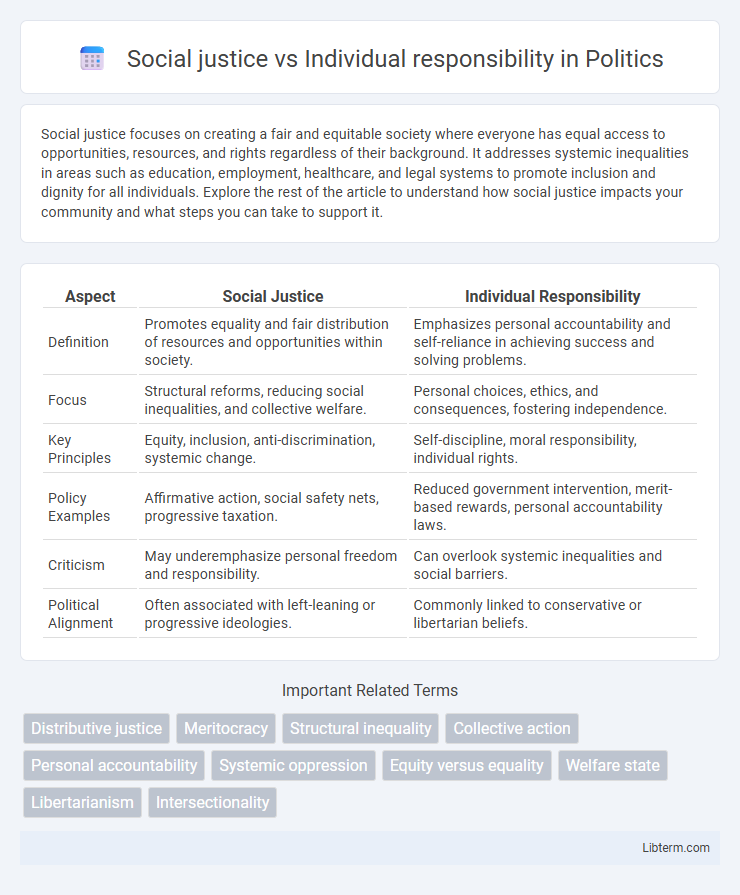Social justice focuses on creating a fair and equitable society where everyone has equal access to opportunities, resources, and rights regardless of their background. It addresses systemic inequalities in areas such as education, employment, healthcare, and legal systems to promote inclusion and dignity for all individuals. Explore the rest of the article to understand how social justice impacts your community and what steps you can take to support it.
Table of Comparison
| Aspect | Social Justice | Individual Responsibility |
|---|---|---|
| Definition | Promotes equality and fair distribution of resources and opportunities within society. | Emphasizes personal accountability and self-reliance in achieving success and solving problems. |
| Focus | Structural reforms, reducing social inequalities, and collective welfare. | Personal choices, ethics, and consequences, fostering independence. |
| Key Principles | Equity, inclusion, anti-discrimination, systemic change. | Self-discipline, moral responsibility, individual rights. |
| Policy Examples | Affirmative action, social safety nets, progressive taxation. | Reduced government intervention, merit-based rewards, personal accountability laws. |
| Criticism | May underemphasize personal freedom and responsibility. | Can overlook systemic inequalities and social barriers. |
| Political Alignment | Often associated with left-leaning or progressive ideologies. | Commonly linked to conservative or libertarian beliefs. |
Understanding Social Justice: Core Principles
Social justice emphasizes equitable distribution of resources, opportunities, and privileges within a society to address systemic inequalities such as income disparity, racial discrimination, and access to education. Core principles include fairness, equality, and human rights, advocating for policies that reduce social barriers and empower marginalized communities. Understanding social justice involves recognizing structural factors that influence individual outcomes beyond personal effort or responsibility.
Defining Individual Responsibility in Society
Individual responsibility in society refers to the obligation of each person to act ethically, contribute positively, and respect the rights of others while fulfilling personal duties. This concept emphasizes accountability for one's actions, encouraging self-discipline, civic engagement, and respect for social norms to foster community well-being. Balancing individual responsibility with collective social justice ensures that personal freedoms coexist with efforts to address systemic inequalities and promote fairness.
Historical Perspectives on Justice and Responsibility
Historical perspectives on justice and responsibility reveal a complex interplay between social justice frameworks and individual accountability. Philosophers like John Rawls emphasized fairness and equality in social institutions, while classical thinkers such as Aristotle highlighted personal virtue and responsibility. These evolving views reflect broader societal shifts in balancing collective rights with individual duties across different historical eras.
Social Justice: Addressing Systemic Inequality
Social justice targets systemic inequality by advocating for equal access to education, healthcare, and economic opportunities. It emphasizes dismantling structural barriers such as racial discrimination, income disparity, and unequal legal protections to promote fairness across all societal groups. Policies like affirmative action and universal basic income are examples designed to reduce entrenched social disparities and empower marginalized communities.
The Role of Individual Actions in Social Change
Individual actions serve as critical catalysts for social change by fostering grassroots movements and influencing policy through collective effort. Personal accountability encourages ethical behavior and civic engagement, which amplify the impact of social justice initiatives. Empowered individuals contribute to systemic transformation by challenging inequalities and promoting fairness within their communities.
Tension Between Collective Good and Personal Freedom
Balancing social justice and individual responsibility highlights the tension between collective welfare and personal freedom, where social justice emphasizes equal access to resources and opportunities for marginalized groups, while individual responsibility stresses personal accountability and autonomy. Policies aimed at promoting social equity often challenge the limits of personal choice, raising debates on government intervention and individual rights. Understanding this dynamic is essential for addressing disparities without undermining personal freedoms.
Case Studies: Balancing Group Equity and Personal Accountability
Case studies in social justice vs individual responsibility reveal conflicts between group equity and personal accountability, such as affirmative action policies balancing minority representation with merit-based selection. Examples from workplace diversity programs demonstrate how organizations implement equitable hiring while holding employees accountable for performance outcomes. Judicial decisions on discrimination cases often navigate the tension between collective redress and individual rights, highlighting the complexity of achieving fairness without undermining personal responsibility.
Criticisms of Social Justice Movements
Criticisms of social justice movements often highlight the tension between collective equity goals and individual responsibility, arguing that emphasizing systemic change can overshadow personal accountability. Critics contend that some social justice initiatives may impose a uniform moral framework that conflicts with diverse individual values and freedoms. This debate intensifies in policy discussions where redistributive efforts are viewed as potentially disincentivizing personal effort and merit-based achievement.
Fostering Collaboration: Integrating Both Approaches
Fostering collaboration between social justice and individual responsibility involves creating systems that empower personal accountability while addressing structural inequalities. Integrative frameworks emphasize community engagement and equitable resource distribution to ensure both collective well-being and individual growth. Effective collaboration balances societal support mechanisms with personal initiative to achieve sustainable and inclusive progress.
Building a Just Society: Finding Common Ground
Building a just society requires balancing social justice principles with the emphasis on individual responsibility to ensure fairness and equity. Policies promoting equal opportunities must coexist with frameworks encouraging personal accountability in economic and social decisions. Fostering collaboration between community-driven support systems and individual empowerment initiatives creates sustainable progress toward social cohesion and inclusivity.
Social justice Infographic

 libterm.com
libterm.com